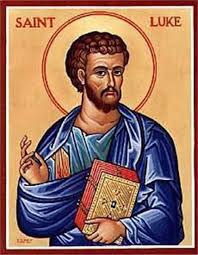HOMILY WEEK 28 03 – Year I
Disciples of Mercy: Feast of St Luke
(2 Tim 4:9-17; Ps 145; Lk 10:1-9)
****************************************
“From among his disciples Jesus appointed seventy and sent them on ahead of him in pairs.”
The feast of St. Luke, and the readings we hear, invite us to be missionary disciples, building community and proclaiming a Kingdom of Mercy.
First of all, Jesus had many followers, disciples. That makes us also disciples of Jesus as his followers. The Greek word for disciple is mathetes, meaning “learner” – someone who is always learning more and more about what it means to follow Jesus. Adam Exner OMI, many years ago, taught us that a disciple strives to be a carbon copy of the master, so we are to try to be a carbon copy of Jesus – to think and act like him. As Jesus always sought to do the Father’s will, especially through contemplative prayer, so must we seek to do the will of Jesus, revealed to us especially through the scriptures and contemplative prayer.
That Jesus chose to send out seventy disciples is significant for Luke. Numbers were important to the Hebrew mind, and seventy is a perfect number (the sum of three plus four equals seven, times ten – all perfect numbers). That number signifies fullness, wholeness, completeness, newness. Jesus, through his disciples, is bringing about a whole new world order that will culminate in his resurrection and the sending of the Spirit at Pentecost that birthed the church.
The fact Jesus sent them out in pairs is also very significant – a sign that love for one another and building community is essential to the kingdom of God. In the past, religious communities like the Oblates sacrificed community for the sake of the apostolate. In today’s world, however, where human relationships and interaction are becoming more and more digital and difficult to maintain, we are coming to realize that building community is perhaps the most important apostolate we can carry out, as a sign of the Kingdom. It is encouraging to hear Fr. Bonga, director of the Oblate Renewal program in Aix-en-Provence, France, teaching precisely that in his retreats around the Oblate world.
The task of the disciples, then, was to build community and proclaim that the Kingdom of heaven was near. St. Paul puts it this way: “The Lord gave me strength so that through me the message might be fully proclaimed and all the Gentiles might hear it.”
Paul’s definition of the Kingdom of Heaven in Romans is the peace, joy and justice of the Holy Spirit. Peace is not a passing emotion – it is a gift of the Holy Spirit we can claim as followers of Jesus. Joy is also not just a passing emotion like happiness – it is a gift of the Holy Spirit we can also claim. The justice of the Holy Spirit is a right relationship with God, with all other people in my life, with myself through self-esteem and self-confidence, and with all of God’s creation through caring for ecology.
My motto as a bishop is Regnum Dei Intra Vos – the kingdom of God is among you. It comes from Luke 17:21, the only place in the New Testament where Jesus does not only say the kingdom is near or we are not far from the kingdom, but that it is actually a present reality in and among us. So, we are to not only proclaim the kingdom of God, but even more important, we are to live within that kingdom every day of our lives.
 Historical sources are unanimous in claiming the author of the third gospel and of the Acts of the Apostles is a physician named Luke. He was undoubtedly a Gentile Christian and wrote for other Gentiles who did not have a background of the Old Testament in which to root their faith. He was a dedicated evangelist whose writings show him to be highly educated with considerable literary skill. He is a patron of the medical profession.
Historical sources are unanimous in claiming the author of the third gospel and of the Acts of the Apostles is a physician named Luke. He was undoubtedly a Gentile Christian and wrote for other Gentiles who did not have a background of the Old Testament in which to root their faith. He was a dedicated evangelist whose writings show him to be highly educated with considerable literary skill. He is a patron of the medical profession.
He was a loyal companion of St. Paul and fellow worker with him. Luke wrote more extensively than any other New Testament author aside from Paul. In particular he stresses God’s love and unconditional mercy, shown especially through stories and parables such as the Good Samaritan, the Ten Lepers, the Pharisee and the tax collector, the woman who anoints Jesus’ feet, and especially the incomparable parable of the Prodigal Son which I prefer to call the Loving Father and the Two Lost Sons. He presents a God who is eager to lavish mercy on sinners, and teaches there is no sin God won’t forgive. He models what it means to be missionary disciples proclaiming a kingdom of mercy, something that Pope Francis also encourages.
The Eucharist on this feast day of St. Luke is itself an experience of God’s mercy here and now. We are forgiven and healed by God’s word and the body and blood of Jesus, and sent out as missionary disciples to build community, the body of Christ, and proclaim the Kingdom of God’s mercy.



